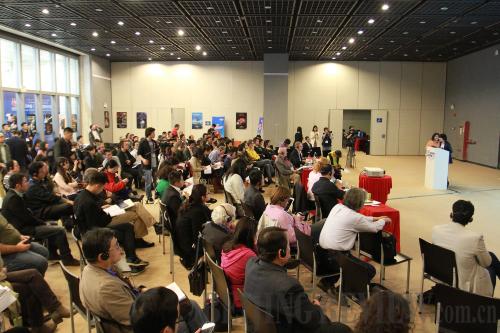|
 |
|
LOOKING FOR PARTNERS: Chinese and overseas producers discuss documentary production at the 2013 Guangzhou International Documentary Film Festival (CFP) |
On December 13, 2013, Xinhua News Agency reported China's television and broadcasting watchdog has asked satellite TV channels across the country to air at least one half-hour domestic documentary on average daily, starting in 2014, .
Gao Changli, a publicity official with the State General Administration of Press, Publication, Radio, Film and Television (SGAPPRFT), made the remarks at the four-day 2013 Guangzhou International Documentary Film Festival, which concluded on December 12.
Gao said the total documentary broadcast time on the country's 34 satellite TV channels is expected to reach 6,000 hours in 2014. The move aims to boost documentary market sales, meet the needs of domestic audiences and help foster the industry.
The help for homegrown documentaries also include an annual supporting funds of 5 million yuan ($826,000) provided by the SGAPPRFT, according to the official.
The Chinese documentary market has grown rapidly in recent years. For example, during the 2013 Guangzhou International Documentary Film Festival, total sales hit a record 150 million yuan ($24.7 million) with the festival screening 2,071 documentaries from 72 countries and regions, according to a report by the People's Daily last December.
Previously, Chinese audiences were fond of watching entertainment programs. But now, along with the TV industry's boom and the introduction of a large number of international documentaries, interests are becoming more diversified. More people have developed an interest in documentaries based on true stories and produced with high quality.
In 2011, China's largest state-owned television station China Central Television (CCTV) launched the first documentary channel in the country. In 2013, the channel earned a record 400 million yuan ($66 million) in advertising revenue. The price of documentaries has increased to 1,000 yuan ($165) per minute from the benchmark of 10 yuan ($1.65) per minute 10 years ago, according to Cheng Chunli, Deputy Director of the Department of Program Agency at China International Television Corp., the biggest agent for Chinese TV programs. The most expensive documentaries can even cost 10,000 yuan ($1,650) per minute. Cheng made the remarks during a Chinese TV festival last year.
In the past, domestic producers were not willing to make documentaries due to the time-consuming and strenuous nature of production, and the difficulty of recovering costs. Thus, many TV channels chose to buy documentaries from the international market. However, one homegrown documentary changed the situation in 2012. A Bite of China rose to nationwide prominence soon after its debut on CCTV, surpassing other prime time TV programs. The seven-episode documentary chronicled the history and culture of Chinese food. It became a popular topic overnight.
A Bite of China challenged the idea that homegrown documentaries cannot make money and revealed the enormous potential of Chinese documentary makers. The documentary series has been sold to over 20 countries and regions around the world, and earned a record $40,000 per episode, according to Jin Yue, deputy head of CCTV, during the 2013 Guangzhou International Documentary Film Festival. Furthermore, international buyers have become more and more interested in Chinese documentaries in recent years. They hope to introduce China's unique culture and traditions to audiences in their own countries. For instance, The Imperial Palace, produced by CCTV in 2005, has been sold to 126 countries and regions.
Luo Ming, Editor in Chief at CCTV, said, "Domestic documentaries should focus on our long history and rich cultural heritage, which are distinct from other countries."
However, viewers are the final judges. Thus, Chinese documentaries have to be re-edited before being broadcast in other countries. For example, the 12-episode The Imperial Palace was reduced to only two episodes when it was aired in the United States.
Wuzhou Broadcasting Co. is a pioneering documentary maker in China. At present, the company is in partnership with a New Zealand company to produce a documentary on ancient Chinese architecture.
Wang Yuanyuan, Director of the International Cooperation Department of Wuzhou, said, "Over the past decade, we have produced and broadcast over 200 hours of documentaries to the rest of the world through cooperation with our international partners. According to our experience, Chinese documentaries, first of all, should highlight Chinese uniqueness."
"But domestic producers need to learn from their international colleagues how to tell the Chinese story in a way that can be enjoyed by foreign audiences," Wang said.
Email us at: baishi@bjreview.com | 